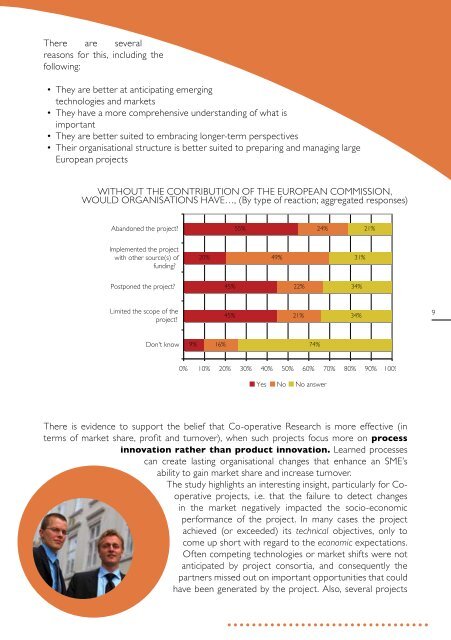SMEs and Research - European Commission - Europa
SMEs and Research - European Commission - Europa
SMEs and Research - European Commission - Europa
You also want an ePaper? Increase the reach of your titles
YUMPU automatically turns print PDFs into web optimized ePapers that Google loves.
There are several<br />
reasons for this, including the<br />
following:<br />
•<br />
•<br />
•<br />
•<br />
They are better at anticipating emerging<br />
technologies <strong>and</strong> markets<br />
They have a more comprehensive underst<strong>and</strong>ing of what is<br />
important<br />
They are better suited to embracing longer-term perspectives<br />
Their organisational structure is better suited to preparing <strong>and</strong> managing large<br />
<strong>European</strong> projects<br />
Without the contribution of the <strong>European</strong> <strong>Commission</strong>,<br />
WITHOUT THE CONTRIBUTION OF THE EUROPEAN COMMISSION,<br />
WOULD ORGANISATIONS would organisations have…, HAVE…, by type (By type of reaction of reaction; (aggregated aggregated responses) responses)<br />
Ab<strong>and</strong>oned the project?<br />
Implemented the project<br />
with other source(s) of<br />
funding?<br />
Postponed the project?<br />
Limited the scope of the<br />
project?<br />
Don't know<br />
9%<br />
20%<br />
Note: Total number of respondents: 1169<br />
16%<br />
45%<br />
45%<br />
There is evidence to support the belief that Co-operative <strong>Research</strong> is more effective (in<br />
terms of market share, profit <strong>and</strong> turnover), when such projects focus more on process<br />
innovation rather than product innovation. Learned processes<br />
can create lasting organisational changes that enhance an SME’s<br />
ability to gain market share <strong>and</strong> increase turnover.<br />
The study highlights an interesting insight, particularly for Co-<br />
55%<br />
49%<br />
0% 10% 20% 30% 40% 50% 60% 70% 80% 90% 100%<br />
operative projects, 92 i.e. that the failure to detect changes<br />
in the market negatively impacted the socio-economic<br />
performance of the project. In many cases the project<br />
achieved (or exceeded) its technical objectives, only to<br />
come up short with regard to the economic expectations.<br />
Often competing technologies or market shifts were not<br />
anticipated by project consortia, <strong>and</strong> consequently the<br />
partners missed out on important opportunities that could<br />
have been generated by the project. Also, several projects<br />
22%<br />
21%<br />
74%<br />
24%<br />
Yes No No answer<br />
31%<br />
34%<br />
34%<br />
21%<br />
9
















